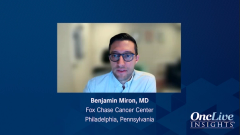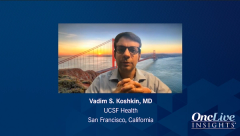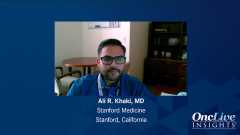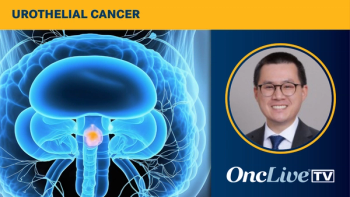
Advanced Bladder Cancer: Adopting Newer Therapies into Clinical Practice
Bradley McGregor, MD, reacts to treatment advances for advanced bladder cancer and shares perspective on utilizing newer, novel therapies as the field continues to evolve
Episodes in this series
Bradley McGregor, MD: For the longest time, we had platinum agents, and there’s been a revolution in therapy for urothelial carcinoma, now with platinum-based therapy followed by avelumab maintenance as standard of care. But for patients who progress in that situation, we’ve had recent approvals for multiple drugs in that space, including erdafitinib for those who have FGFR alterations, as well as enfortumab vedotin and sacituzumab govitecan, which are both approved post-platinum and post-I/O [immuno-oncology], independent of any alterations. Enfortumab vedotin is approved post–first-line therapy for patients ineligible for cisplatin-based therapy.
For the longest time, we had no trials in urothelial carcinoma that showed overall survival benefit. Now, not only do we have that, we also have multiple positive trials with the advent of I/O therapy, with at 1 point 5 different checkpoint inhibitors approved. Then we had the ASCO [American Society of Clinical Oncology] Plenary Session for JAVELIN Bladder 100 showing improvement in survival to I/O maintenance. It’s quite remarkable. We also now have a New England Journal of Medicine paper for enfortumab vedotin showing improvement in overall survival vs taxane. We also had the accelerated approval of sacituzumab govitecan and a New England Journal of Medicine paper for erdafitinib. There has been a remarkable evolution in how we look at urothelial carcinoma, and it’s dramatically changing the outlook for our patients.
At the end of the day, we all agreed that therapy for advanced urothelial carcinoma involves a discussion with the patient about what the most appropriate therapy is. When we start looking at the situation in metastatic disease, the first question we have to ask ourselves is whether the patient is cisplatin-eligible. There’s been a lot of talk about this overall. We talked about what makes the patient cisplatin-eligible. We started saying that we’re looking for a GFR [glomerular filtration rate] of probably over 60 mL/min, but potentially as low as 50 mL/min with split-dose cisplatin, with no significant hearing loss, no significant neuropathy, and a relatively good performance status.
We all agreed that if a patient is cisplatin-eligible, that remains the gold standard in the frontline setting. Because despite all the advances, we have seen that there can be a 10% to 15% durable complete response rate with cisplatin. So if we can give cisplatin, we’re going to do that. If we can’t give cisplatin, given the JAVELIN Bladder 100 data, everyone feels that the combination of carboplatin with gemcitabine followed by maintenance avelumab would be standard of care. Then, the question is whether there’s a patient who’s platinum-ineligible. If there’s a patient who’s platinum-ineligible, with very poor performance status, and a GFR less than 30 mL/min where you’re worried, that’s where there’s only indication for immunotherapy monotherapy in the frontline setting.
We’ve talked about great advances that we’ve had in the metastatic setting. We’ve seen data for enfortumab vedotin and pembrolizumab in patients who are cisplatin-ineligible showing responses close to 70% and duration of response over 2 years, which is quite remarkable. There’s an ongoing trial looking at platinum-based therapy vs enfortumab vedotin and pembrolizumab, which is very exciting. But what I’m most excited about is preventing patients from getting to that stage. Can we prevent patients from getting metastatic disease? Despite all the advances we’ve had in the metastatic setting, at the end of the day, for neoadjuvant therapy, it’s cisplatin-based therapy.
We have great data with the advent of immune checkpoint inhibitors, with nivolumab approval giving a DFS [disease-free survival] benefit. We haven’t seen whether that translates to overall survival benefit. We’re optimistic. But can we take some of these new drugs and move them into the perioperative space? Unfortunately, most patients with urothelial carcinoma aren’t going to be able to see cisplatin in the perioperative space, given the patient demographics. So can we take these impressive response rates in the metastatic setting with some of these combinations and move them into the perioperative space and hopefully prevent patients from ever getting to that point? That’s what I’m most excited about.
You’d hope that the improvement in DFS is going to translate into an overall survival benefit, and I hope that’s the case. Longer-term follow-up will be necessary. [It’s important that] the patient understands the risks of therapy, because immunotherapy isn’t completely benign. There are risks of immune-related adverse events and the need for high-dose steroids. But especially in urothelial carcinoma, where the rates are quite high based on the stage, like in node-positive or ypT3b, following platinum-based therapy, it’s certainly compelling data and merits discussion with the patient. Ultimately, we want to see an overall survival benefit, and we hope that translates into overall survival benefit. But as we wait for that, it’s great that we’re able to offer this treatment to our patients, while discussing the limitations of where we’re at.
Transcript edited for clarity.







































